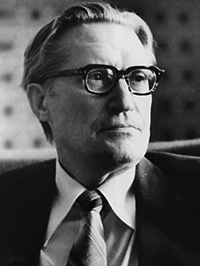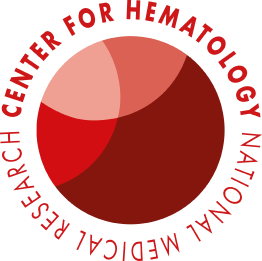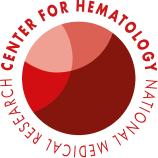
Oleg K. Gavrilov (
Oleg Gavrilov was born in Samara, Russia into the family of a military surgeon. He graduated from the Kuibyshev Military Medical Academy, the Military Department of the 2nd Moscow Medical Institute (1939-1943). He continued his education at the Department of Advanced Training for Doctors of the Leningrad Military Medical Academy (1950-1952).
During the Great Patriotic War (WWII), as a surgeon, senior doctor of the regiment, and brigade doctor of the Airborne Forces, Gavrilov took part in hostilities on the Karelian and 3rd Ukrainian fronts. After the end of the war, he served as a divisional doctor in the Airborne Division in the Far East.
Gavrilov began teaching at the Leningrad Military Medical Academy in 1952, and in 1968 he was appointed head of the Military Medical Faculty of the Central Institute for Advanced Medical Studies in Moscow. In 1955 he defended his Ph.D., and in 1965 - his doctoral dissertation on the problems of military medicine and blood service in the Armed Forces. In 1967 Gavrilov was awarded the academic title of Professor, and Colonel of the medical service.
After completing his military service, Gavrilov worked as vice-rector for medical work at the 1st Moscow Medical Institute, as the Director of the Central Institute of Hematology and Blood Transfusion in Moscow, and as Chairman of the Scientific Medical Council of the USSR Ministry of Health.
Oleg Gavrilov considered his teachers to be outstanding figures of Russian medical science: Academician B.V. Petrovsky, under whose leadership he worked for many years, as well as scientists from St. Petersburg - Academicians P.A. Kupriyanov, V.N. Filatov, Professors A. S. Georgievsky and P. P. Goncharov. Their influence determined the main directions of scientific activity of Academician O. K. Gavrilov - research in the field of organization of medical support for the country’s Armed Forces; general, clinical and industrial transfusiology; hematology, hemoagregatology, and blood surgery; history of medicine.
Gavrilov took part in the development of new principles for organizing medical support for military formations and operational formations of the Armed Forces in conditions of mass destruction by super-powerful weapons. The majority of his works are devoted to the organization of the blood service in the Armed Forces and in the country's health care system. As a result of large-scale research in the Armed Forces, a two-stage method of blood procurement was introduced, a modern system for organizing donation was created, monographs on blood and blood transfusion substitutes, donation, and guidelines on blood transfusion, and mass blood procurement were published.
It was Gavrilov that for the first time gave a clear definition of transfusiology as a scientific discipline and characterized its three components - general, clinical, and industrial. Under the leadership of Oleg Gavrilov, a tremendous amount of work was carried out in the blood service: methods of plasma fractionation, blood cryopreservation, preparation of blood products and components, plasmapheresis and cytapheresis, methods of preventing viral hepatitis, as well as the introduction of immune blood products to the country's blood transfusion stations.
On the initiative and under the leadership of Gavrilov, unique complex studies were launched aimed on resolving a number of new problems such as creating blood substitutes for oxygen carriers based on emulsions of perfluoroorganic compounds and modified hemoglobin, drugs for parenteral nutrition, anti-shock agents based on hydroxyethyl starch, new detoxifying agents, the use of ferromagnets in medicine, and the development of new cytostatic drugs, including those in liposomal forms. Dozens of research institutes, universities, enterprises, and medical institutions took part in these studies. The entirety of these efforts was coordinated by the Problem Commission of the USSR Ministry of Health, chaired by Oleg K. Gavrilov.
Gavrilov proposed and received wide recognition for the modern classification of transfusion agents. The results of extensive work on the scientific and organizational foundations of the blood service are summarized in special monographs published for the 50th anniversary of the Central Institute of Hematology and Blood Transfusion.
Issues of molecular hematology, hemostasiology, and hemoagregatology occupied a significant place in Gavrilov's research.
Gavrilov proposed the theory of the aggregate state of blood and the theory of the systemic organization of the functions of regulation of the aggregate state of blood in normal conditions and in various diseases. Under his leadership, a new direction in the science of blood developed - hemoaggregatology and blood surgery.
The term "gravitational blood surgery" introduced by Gavrilov includes the theoretical and practical substantiation of the currently widely used "gravsurgical methods" such as plasma exchange, plasmacytapheresis, and the creation of special hardware methods for their application. The use of these modern methods for various pathologies made it possible to remove circulating toxins, immune complexes, antibodies, complement activation products, immunocompetent, and blast cells. The developments of Oleg Gavrilov led to the widespread use of unique therapeutic methods for restoring and maintaining homeostasis, eliminating immune disorders and toxicosis, which made it possible, in particular, to increase the effectiveness of treatment of diseases of the blood system in patients with acute myocardial infarction and angina pectoris, with autoimmunization, etc.
On the initiative and with the active participation of Professor Gavrilov, in 1998, the Research Testing Complex for Blood Surgery of the Russian Academy of Medical Sciences was created and is successfully operating today, continuing research in hemoaggregatology and introducing new therapeutic methods into practice. In large medical institutions of the country, departments of gravitational blood surgery are presently operating.
The merit of Professor Gavrilov as Director of the Central Institute of Hematology and Blood Transfusion was the evolution of the most pressing issues in the blood and transfusion service. Among these issues: the development and implementation of plasticate equipment for blood service, modern preservative solutions for blood and its components; the advancement of the problem of fractionation of donor blood into components; the advancement of the problem of blood substitutes and, in particular, with the function of oxygen transfer; development and advancement of methods for the study of donor blood to prevent viral infection; publication of modern guidelines and reference books on industrial and clinical transfusiology; the development of broad international relations, in particular with the United States, which made it possible to conduct research at a modern level and improve the scientific qualifications of employees; extensive developments in problems of blood coagulation. During the years of his leadership, new types of hemoglobin were discovered at the Institute, immunological typing for HLA antibodies was introduced, the development of blood substitutes for oxygen carriers and artificial blood deprived of group antigens was launched, and the first hybridomas producing monoclonal antibodies were created.
A number of works by Gavrilov are devoted to the general history of the development and use of blood transfusion, the history of the Moscow and St. Petersburg hematological schools, the history of the development of the doctrine of hematopoiesis, the history of the social and sanitary consequences of wars, and the history of the country's blood service during the Great Patriotic War (WWII).

In 1974 Gavriolov was elected a corresponding member, and in 1982, a full member of the USSR Academy of Medical Sciences.
In the 62 years of medical-organizational, clinical and scientific activity, Gavrilov published more than 600 articles, 24 monographs, edited a section of Hematology in the 3rd edition and 28 volumes of "Soviet Hematological Reviews" published in London in English. Among the monographs: "Essays on the History of the Development and Use of Blood Transfusion" (1968), "Donation" (1970), "Transfusion of Blood and Blood- Substituting Fluids" (1969), "Social and Hygienic Problems and the Consequences of Wars" (1975), "Normal Hematopoiesis and its Regulation "(1976)," Guidelines for General and Clinical Transfusiology "(1979)," Manual for Transfusiology "(1980)," Surgical Methods for the Treatment of Diseases of the Blood System "(1981)," Mass Procurement of Blood "(1981), "Problems and Hypotheses in the Theory of Blood Coagulation" (1981), and "Cells of Blood and Bone Marrow" (1985),
Under his supervision, 16 doctoral and 38 candidate dissertations were defended.
Gavrilov's scientific activity has become widely known and recognized in Russia and abroad. On his initiative, the All-Union Society of Hematologists and Transfusiologists was created in 1975. O.K. Gavrilov was also a member of international societies of hematologists and transfusiologists, an honorary member of the Hungarian Society of Hematologists and Transfusiologists, and an honorary member of the Jan Evangelist Purkinje Medical Society (Czech Republic).
Gavrilov was a leader of academic circles, was a scientific consultant of the Research Testing Complex for Blood Surgery, a member of the Bureau of the Department of Clinical Medicine of the Russian Academy of Medical Sciences, and was on the editorial board of a number of medical journals, including journals published abroad.
Oleg K. Gavrilov was awarded with Orders of Lenin, the Red Banner of Labor, two Orders of the Patriotic War of the II degree, two Orders of the Red Star, two medals "For Military Merit", medals "For the capture of Vienna", "For victory over Germany", among others.


